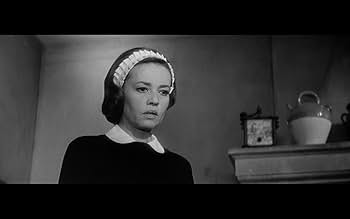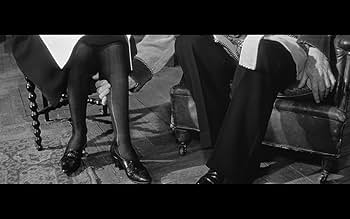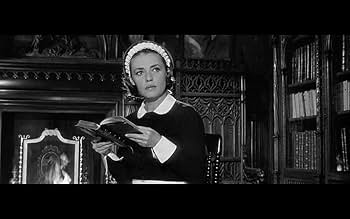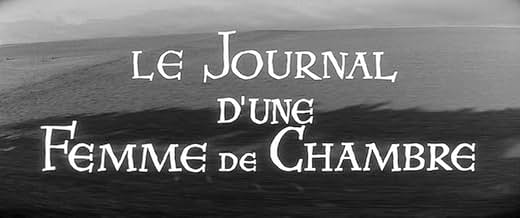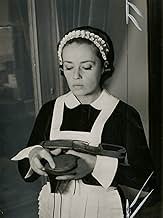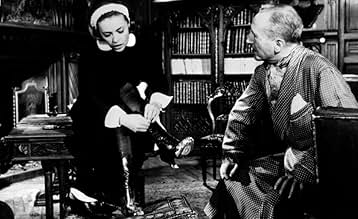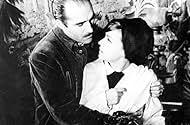Le journal d'une femme de chambre
- 1964
- Tous publics
- 1h 37m
IMDb RATING
7.4/10
10K
YOUR RATING
A sophisticated and self-assured woman from Paris joins a middle-class rural estate as a maid and causes quite a stir among the variously uptight, perverse and violent inhabitants.A sophisticated and self-assured woman from Paris joins a middle-class rural estate as a maid and causes quite a stir among the variously uptight, perverse and violent inhabitants.A sophisticated and self-assured woman from Paris joins a middle-class rural estate as a maid and causes quite a stir among the variously uptight, perverse and violent inhabitants.
- Director
- Writers
- Stars
- Awards
- 1 win & 2 nominations total
- Director
- Writers
- All cast & crew
- Production, box office & more at IMDbPro
Featured reviews
I will say outright that not only is Luis Bunuel my favorite film director but I also consider him one of the ten of the all-time greatest. Rarely did a renowned film-maker make such a remarkable comeback after years of exile as Bunuel did with LOS OLVIDADOS (1950) and, even rarer still, did one director have such a sustained series of masterworks released towards the twilight of his career. Having said all this, however, I think that LE JOURNAL D'UNE FEMME DA CHAMBRE aka DIARY OF A CHAMBERMAID (1964) is the weakest of the final ten feature films Bunuel made during the most fruitful period of his career (between 1961 and 1977) if such a choice were to be made, that is.
Don't get me wrong; I do think that LE JOURNAL is an excellent film and would probably be considered a bona-fide masterpiece if it were made by a lesser director. There is much to enjoy in the film: Jeanne Moreau's superb central performance as the opportunistic Celestine stricken by an unexpected sense of moral duty prompting her to nail the killer of the child even if she has to marry him to do so; Michel Piccoli's hilarious turn as the eternally insatiable but perennially unsatisfied master of the household who, when his sexual advances towards Celestine are turned down by the latter, has to make do with the ugly-looking house-maid; the aged father-in-law who invites Celestine into his room to read for him, all the while indulging in his foot fetish; the sadistic manservant who thinks nothing of violating and murdering innocent little girls while nurturing dreams of sealing his independence with the purchase of a pub all his own and with Celestine as his partner; the eccentric neighbour who sabotages their garden at every turn and yet yearns for Celestine's companionship, etc. Bunuel offers a typically scathing satire of the bourgeoisie here and, as has already been stated by others in this thread, also shows that he is adept at utilizing the widescreen format despite this being his first and only stab at it, as well as imbuing seemingly trivial and innocent sequences with a subtly perverse touch of subversion.
Even so, I do tend to generally agree with eminent film critic Leslie Halliwell's verdict on this particular film: 'Interesting but not especially successful Bunuel version; the subject is certainly up his street but the novel (by Octave Mirbeau) seems to restrict him'. I found the ending incomprehensible and disappointing myself at first but now I can appreciate not only its irony but its audacity. I have now watched the film three times twice on VHS and once on Criterion's DVD and I must say that it does improve with each viewing.
I don't know if anyone of you has seen Jean Renoir's 1946 US film version but somehow I actually prefer it to Bunuel's. I can't say I concur with Halliwell's review this time around dismissing as it did Renoir's film: 'Hollywood notables were all at sea in this wholly artificial and unpersuasive adaptation of a minor classic'! Leonard Maltin, a well-known US film critic, didn't like it much either saying that it was an 'uneasy attempt at a Continental-style romantic comedy tries hard but never really sure of what it wants to be (the cast) do their best to liven things'! Based on these two capsule reviews I was hardly expecting it to be a patch on the Bunuel version but I nevertheless purchased the PAL VHS (issued by 4 Front but subsequently deleted) since it was quite cheap and, after all, medium Renoir (another of my favorites, by the way) is better than many other film-makers around!
But, surprisingly, what could have easily been a inconsequential and frothy comedy of manners (the result of the typically sanitized Hollywood rewrites of subversive European literature) turned out to be an unprecedented black comedy with that uniquely French bleak outlook of things. Paulette Goddard plays Celestine in this one and she has probably never been better. In fact, as was also the case with the later Bunuel adaptation, the performances here are all first-rate: Hurd Hatfield as the idealistic young son who falls hopelessly in love with Celestine; Judith Anderson as the lady of the house firmly in control of every situation but with some strange alliances of her own; Irene Ryan as a timid scullery maid; Reginald Owen as the weak-willed master of the house perpetually harassed by his wife's demands; and particularly Burgess Meredith (who also wrote the screenplay!) as the half-crazed and shell-shocked retired Army Captain who is their neighbor; but especially Francis Lederer whose portrayal of the devilish manservant Joseph lusting after Celestine while scheming behind the back of his oppressive masters is quite chilling.
Doing some more reading on this film after watching it a couple of times, I found out that there are those who think more highly of Renoir's DIARY OF A CHAMBERMAID than I was previously led to believe. In fact, if I'm not mistaken, no less an authority than Andre' Bazin, in his famous unfinished critical study of Renoir's films, goes so far as to call it a masterpiece and the finest of all the films Renoir made in America between 1941 and 1947. Well, who am I to argue? I do recommend that you seek it out if you have the chance if only to see how it compares with the more readily available Bunuel version.
The thing which struck me most when comparing these two film versions is how different the plot-line actually is from one film to the other. I haven't read the book so I can't say which is the more legitimate one but the differences are quite noteworthy: while there is no child murder in the Renoir version, Joseph does get to kill the eccentric neighbor; there is no handsome young master in Bunuel's version; there is no aged patriarch in Renoir's version; Joseph does not survive to see the realization of his dreams in the Renoir version but rather gets himself slightly killed in a climactic fight in the city streets with Celestine's young pretender, etc. I think it would be a worthwhile exercise if I were to get my hands on Octave Mirbeau's original novel some day!
As a matter of fact, I think a similarly fascinating comparison could be made between (incidentally, another favorite director of mine) Josef von Sternberg's final film with Marlene Dietrich, THE DEVIL IS A WOMAN (1935) and Luis Bunuel's cinematic swan song, CET OBSCUR OBJET DU DESIR aka THAT OBSCURE OBJECT OF DESIRE (1977) both of which were adapted from the same source material: Pierre Louys' 'La Femme Et Le Pantin'.
Don't get me wrong; I do think that LE JOURNAL is an excellent film and would probably be considered a bona-fide masterpiece if it were made by a lesser director. There is much to enjoy in the film: Jeanne Moreau's superb central performance as the opportunistic Celestine stricken by an unexpected sense of moral duty prompting her to nail the killer of the child even if she has to marry him to do so; Michel Piccoli's hilarious turn as the eternally insatiable but perennially unsatisfied master of the household who, when his sexual advances towards Celestine are turned down by the latter, has to make do with the ugly-looking house-maid; the aged father-in-law who invites Celestine into his room to read for him, all the while indulging in his foot fetish; the sadistic manservant who thinks nothing of violating and murdering innocent little girls while nurturing dreams of sealing his independence with the purchase of a pub all his own and with Celestine as his partner; the eccentric neighbour who sabotages their garden at every turn and yet yearns for Celestine's companionship, etc. Bunuel offers a typically scathing satire of the bourgeoisie here and, as has already been stated by others in this thread, also shows that he is adept at utilizing the widescreen format despite this being his first and only stab at it, as well as imbuing seemingly trivial and innocent sequences with a subtly perverse touch of subversion.
Even so, I do tend to generally agree with eminent film critic Leslie Halliwell's verdict on this particular film: 'Interesting but not especially successful Bunuel version; the subject is certainly up his street but the novel (by Octave Mirbeau) seems to restrict him'. I found the ending incomprehensible and disappointing myself at first but now I can appreciate not only its irony but its audacity. I have now watched the film three times twice on VHS and once on Criterion's DVD and I must say that it does improve with each viewing.
I don't know if anyone of you has seen Jean Renoir's 1946 US film version but somehow I actually prefer it to Bunuel's. I can't say I concur with Halliwell's review this time around dismissing as it did Renoir's film: 'Hollywood notables were all at sea in this wholly artificial and unpersuasive adaptation of a minor classic'! Leonard Maltin, a well-known US film critic, didn't like it much either saying that it was an 'uneasy attempt at a Continental-style romantic comedy tries hard but never really sure of what it wants to be (the cast) do their best to liven things'! Based on these two capsule reviews I was hardly expecting it to be a patch on the Bunuel version but I nevertheless purchased the PAL VHS (issued by 4 Front but subsequently deleted) since it was quite cheap and, after all, medium Renoir (another of my favorites, by the way) is better than many other film-makers around!
But, surprisingly, what could have easily been a inconsequential and frothy comedy of manners (the result of the typically sanitized Hollywood rewrites of subversive European literature) turned out to be an unprecedented black comedy with that uniquely French bleak outlook of things. Paulette Goddard plays Celestine in this one and she has probably never been better. In fact, as was also the case with the later Bunuel adaptation, the performances here are all first-rate: Hurd Hatfield as the idealistic young son who falls hopelessly in love with Celestine; Judith Anderson as the lady of the house firmly in control of every situation but with some strange alliances of her own; Irene Ryan as a timid scullery maid; Reginald Owen as the weak-willed master of the house perpetually harassed by his wife's demands; and particularly Burgess Meredith (who also wrote the screenplay!) as the half-crazed and shell-shocked retired Army Captain who is their neighbor; but especially Francis Lederer whose portrayal of the devilish manservant Joseph lusting after Celestine while scheming behind the back of his oppressive masters is quite chilling.
Doing some more reading on this film after watching it a couple of times, I found out that there are those who think more highly of Renoir's DIARY OF A CHAMBERMAID than I was previously led to believe. In fact, if I'm not mistaken, no less an authority than Andre' Bazin, in his famous unfinished critical study of Renoir's films, goes so far as to call it a masterpiece and the finest of all the films Renoir made in America between 1941 and 1947. Well, who am I to argue? I do recommend that you seek it out if you have the chance if only to see how it compares with the more readily available Bunuel version.
The thing which struck me most when comparing these two film versions is how different the plot-line actually is from one film to the other. I haven't read the book so I can't say which is the more legitimate one but the differences are quite noteworthy: while there is no child murder in the Renoir version, Joseph does get to kill the eccentric neighbor; there is no handsome young master in Bunuel's version; there is no aged patriarch in Renoir's version; Joseph does not survive to see the realization of his dreams in the Renoir version but rather gets himself slightly killed in a climactic fight in the city streets with Celestine's young pretender, etc. I think it would be a worthwhile exercise if I were to get my hands on Octave Mirbeau's original novel some day!
As a matter of fact, I think a similarly fascinating comparison could be made between (incidentally, another favorite director of mine) Josef von Sternberg's final film with Marlene Dietrich, THE DEVIL IS A WOMAN (1935) and Luis Bunuel's cinematic swan song, CET OBSCUR OBJET DU DESIR aka THAT OBSCURE OBJECT OF DESIRE (1977) both of which were adapted from the same source material: Pierre Louys' 'La Femme Et Le Pantin'.
The best thing about Bunuel is his ruthless lucidity, and it's thoroughly on display here. All his films start from the conviction that no one is to be pitied - or even if they are, Bunuel, like life, will not oblige, and neither the audience nor the person concerned should expect it of them. Which is not to say that all abuses are right - the film postulates that between fascist and violent criminal there is little difference, and then, true to lucid form, makes it clear at the end that evil does *not* automatically bring about its own destruction; a fact not to be lamented but fought over. Bunuel said he thought it was his most erotic film. It's not an unreasonable claim. There's not a single sex scene. Go figure.
Luis Buñuel, the man considered Spain's finest filmmaker and revered master of surrealism by both critics and film historians, made a surprising change of style in the first of the series of masterpiece she did in France during his last years. Taking out his usual surrealist set-pieces, he adapts Octave Mirbeau's revered novel about social classes in a very straight-forward fashion. However, this does not mean the movie is bad as many may believe; quite the opposite, "Le Journal d'eune Femme de Chambre" is a perfect showcase of Buñuel's finest film-making style, ambiguous and stylish, like the master's own vision of life.
The plot follows Celestine (Jeanne Moreau), an urban young woman moving to country in 30s France to work as a chambermaid for the Monteils, a rich family with a few dark secrets. As soon as she arrives, problems start as she tries to adapt to her new life with the bizarre Monteils. Between the constant advances of sexually insatiable Monsieur Monteil (Michel Piccoli), the always vigilant eye of his materialist wife (Françoise Lugagne) and the shoe fetish of old Monsieur Rabour (Jean Ozenne); Celestine makes her way through this collection of living portraits of the most bizarre human nature.
With a plot like this it would easy to believe this is a movie where the high class is demonized and the poor sanctified, but this is not the case here. Buñuel makes sure to have an ambiguity in every character, even in Celestine herself. There is no black and white, just different shades of gray, in a way similar to the beautiful black & white photography he uses here.
The photography is essential in this film; not only for aesthetic purposes, it represents the dark decadent days of 30s Europe, and the pessimism latent in both rich and poor people. As I wrote above, the shades of gray match perfectly the ambiguity of a group of characters with as many virtues as flaws. Buñuel and his cast manage to create believable and realistic characters.
Jeanne Moreau gives a brilliant performance as Celestine. As the beautiful young city woman highly intelligent and not without aspirations, her character has enough room to let her shine, and she really makes the most of it. Equally brilliant is Georges Géret as Joseph, the tough gardener with fascist ideals that has a secret agenda. The rest of the cast is also very good and together with the witty script complete a superb character-driven movie.
Buñuel's masterful direction creates a film that, while completely focused on the characters, is still filled with his usual symbolism. The edition and the camera-work are superb and way the camera seems to flow inside the house gives the film a voyeuristic feeling. No wonder why Buñuel consider it a very erotic film.
While many people consider this movie as one of his "lesser works", I consider it to be quite underrated, as it proved that Buñuel was a master not only of surrealism, but of film-making in general. 9/10
The plot follows Celestine (Jeanne Moreau), an urban young woman moving to country in 30s France to work as a chambermaid for the Monteils, a rich family with a few dark secrets. As soon as she arrives, problems start as she tries to adapt to her new life with the bizarre Monteils. Between the constant advances of sexually insatiable Monsieur Monteil (Michel Piccoli), the always vigilant eye of his materialist wife (Françoise Lugagne) and the shoe fetish of old Monsieur Rabour (Jean Ozenne); Celestine makes her way through this collection of living portraits of the most bizarre human nature.
With a plot like this it would easy to believe this is a movie where the high class is demonized and the poor sanctified, but this is not the case here. Buñuel makes sure to have an ambiguity in every character, even in Celestine herself. There is no black and white, just different shades of gray, in a way similar to the beautiful black & white photography he uses here.
The photography is essential in this film; not only for aesthetic purposes, it represents the dark decadent days of 30s Europe, and the pessimism latent in both rich and poor people. As I wrote above, the shades of gray match perfectly the ambiguity of a group of characters with as many virtues as flaws. Buñuel and his cast manage to create believable and realistic characters.
Jeanne Moreau gives a brilliant performance as Celestine. As the beautiful young city woman highly intelligent and not without aspirations, her character has enough room to let her shine, and she really makes the most of it. Equally brilliant is Georges Géret as Joseph, the tough gardener with fascist ideals that has a secret agenda. The rest of the cast is also very good and together with the witty script complete a superb character-driven movie.
Buñuel's masterful direction creates a film that, while completely focused on the characters, is still filled with his usual symbolism. The edition and the camera-work are superb and way the camera seems to flow inside the house gives the film a voyeuristic feeling. No wonder why Buñuel consider it a very erotic film.
While many people consider this movie as one of his "lesser works", I consider it to be quite underrated, as it proved that Buñuel was a master not only of surrealism, but of film-making in general. 9/10
Bunuel's 'Diary Of A Chambermaid' was released in between two of his surreal masterpieces 'The Exterminating Angel' and 'Simon Of The Desert'. It is, on the surface at least, a lot more conventional as either of those, maybe that's why it doesn't get as much attention as it deserves. I don't know why it is rarely mentioned when people discuss the very best of Bunuel, but for me it's almost as great as 'Viridiana' and 'Belle De Jour'. The story was previously filmed by Renoir in the 1940s, but I haven't seen that version, so I can't say how different Bunuel's approach to the material is. As Bunuel claimed not to have seen it either I don't feel so bad. Jean Moreau, the beautiful star of Truffaut's 'Jules And Jim' and countless other Euro art film favourites, gives a brilliant performance as the enigmatic Celestine, maid to The Monteils, a very odd family living in pre-War France. Bunuel includes some of his usual comments about sexual deviance, and France's future under the Nazi occupation haunts the whole film, but what is most interesting to me about the picture is its subtlety and ambiguity. Like 'Belle De Jour' I think each repeated viewing will reveal more, and opinions on its meaning will depend on the individual viewer. Personally I'm still exploring Bunuel's extraordinary body of work. It is exciting doing so. I've probably only seen a third of his output so far, but I've yet to see a movie made by him that is less than fascinating. 'Diary Of A Chambermaid' just might be his most underrated film. I highly recommend it.
Buñuel once said, "Bourgeois morality is for me immoral and to be fought. The morality founded on our most unjust social institutions, like religion, patriotism, the family, culture: briefly, what are called 'the pillars of society'."
I mention this, not to alienate people who might find such a statement offensive, but to suggest insight into his point of view. A viewpoint vigorously defended in this anti-bourgeois, rural tale that has a kick like a mule. Buñuel's truths are just as applicable today but, by putting them in 1930s France, he sweetens the bitter pill with a coating of sex, storytelling and the reassuring fiction that 'things have maybe moved on since then.'
Célestine impresses us. Intelligent, attractive and sophisticated - but she nevertheless needs to earn her living in service. She takes the train from Paris to work as a chambermaid at a country estate. In this lap of wealth, she deals with a panoply of dodgy people. A brutish handyman. A frigidly overbearing Madame Monteil. Madame's lecherous husband and her kinky father. Remarkably, none of these are portrayed as stereotypes. Characters are well fleshed out as Buñuel pits one against another. Madame Monteil earns our sympathy as she confides sexual shortcomings to the priest, who is in turn well-meaning if hopelessly out of touch. Doddering old Monsieur Rabour, although at first shockingly abhorrent with his fixation on women's feet, probably has nothing more harmful than a shoe fetish. "Would you mind if I touch your calf?" he asks (but goes no further up her leg). Is Célestine playing a dangerous game? Is she a libertine? Or just one step ahead of her audience?
The first half of Diary of a Chambermaid is delightful saucy comedy. Buñuel's famed surrealism, that make films like Un Chien Andalou or L'Âge d'Or so formidable, is nowhere to be seen. Nor do we have to grapple with the distanciation of Exterminating Angel, his Brechtian masterpiece of just two years earlier. But be warned, gentle reader. The second half is not only grislier, but by the end Buñuel will have pulled the rug from under your feet. It can be a bleak experience.
Quite apart from a clever story, Diary of a Chambermaid offers many delights, both to casual viewers and serious film analysts. Depending on your viewpoint, Moreau's many-sided performance is either a triumph for feminism or stands feminism on its head. It strips bare the bourgeoisie and capitalist, presenting the rising tide of French fascism as xenophobic intolerance - one we can recognise as replicated in many countries or patriotic cults even today. The hypocrisy of the upper classes is one of 'fur coat and no knickers'; whereas the pious protestations of the lower ranks are shown as the facade from which they lust after the coat itself.
Class-struggle is mirrored by sex-as-power. To men, sex becomes a celebration of might, whether physical, social or financial. To women, it is the potential to entrap with allure. She is always present and always unattainable. Through this implied promise of sexual gratification she bends men to her will. And still projects an aura of 'purity'. Our handyman tortures a goose before killing it rather horrible, but in a way does it add to his raw animal charm? And is Buñuel really just telling a story? Or is he manipulating his audience to drive the point home?
This is also Buñuel's only film made in anamorphic widescreen format. Although not showy, the cinematography is powerful. Credits open to the sound of a rushing steam train. We watch, through Célestine's eyes, the countryside flash by. A wide angle lens increases the sense of movement, as if we are propelled by an unstoppable force.
When Joseph tries to kiss Célestine at night by the bonfire, his posture is that of a vampire. A snail crawling across the a dead and violated body in the woods is as vivid and shocking as anything from Buñuel's earlier catalogue of slit eyeballs and dead donkeys. But it is Buñuel's acerbic vision of all that is wrong, in all layers of society, that is so chilling.
At one point, Monsieur Rabour is reading the French author JK Huysmans. Huysman's view of the world was as pessimistic as Buñuel, but it is Buñuel that makes it so all-encompassing. The festering fascist mob who cheer for Chiappe in our film, are honouring the same chief of police who prohibited Buñuel's L'Âge d'Or (after fascists destroyed the cinema where it was being shown). There were few governments that liked Buñuel, and we can see that the feeling was mutual.
The film is more political than it is entertaining, which may alienate some viewers who start off liking it. Even the title seems cynical I don't recall any suggestion of her keeping a journal. Diary of a Chambermaid is a great vehicle for Moreau, who gets to play so many characters in one. A criticism often levelled at mainstream cinema is that women tend to be decoration in male-driven plots. Célestine (or 'Marie' as she is called in another dig at Catholic - or class - depersonalisation) doesn't so much take over the driving seat as suggest a new perspective from which she is in control. Audiences will divide on whether they ultimately like her or not.
Things may have moved on. Domestic service is less harsh in most parts of the world where it survives today. Fascism has been replaced with virulent if not yet such obvious forms of rampant and aggressive nationalism. Sex is not always a game of power. But forces of immorality still pose in white robes and high office. 'Commoners' still aspire to the evils they decry. The purity of a saint is maybe needed to 'enjoy' Diary of a Chambermaid. But Buñuel stood up for his beliefs. Today, most viewers may content themselves with standing up for his cinematic skills.
I mention this, not to alienate people who might find such a statement offensive, but to suggest insight into his point of view. A viewpoint vigorously defended in this anti-bourgeois, rural tale that has a kick like a mule. Buñuel's truths are just as applicable today but, by putting them in 1930s France, he sweetens the bitter pill with a coating of sex, storytelling and the reassuring fiction that 'things have maybe moved on since then.'
Célestine impresses us. Intelligent, attractive and sophisticated - but she nevertheless needs to earn her living in service. She takes the train from Paris to work as a chambermaid at a country estate. In this lap of wealth, she deals with a panoply of dodgy people. A brutish handyman. A frigidly overbearing Madame Monteil. Madame's lecherous husband and her kinky father. Remarkably, none of these are portrayed as stereotypes. Characters are well fleshed out as Buñuel pits one against another. Madame Monteil earns our sympathy as she confides sexual shortcomings to the priest, who is in turn well-meaning if hopelessly out of touch. Doddering old Monsieur Rabour, although at first shockingly abhorrent with his fixation on women's feet, probably has nothing more harmful than a shoe fetish. "Would you mind if I touch your calf?" he asks (but goes no further up her leg). Is Célestine playing a dangerous game? Is she a libertine? Or just one step ahead of her audience?
The first half of Diary of a Chambermaid is delightful saucy comedy. Buñuel's famed surrealism, that make films like Un Chien Andalou or L'Âge d'Or so formidable, is nowhere to be seen. Nor do we have to grapple with the distanciation of Exterminating Angel, his Brechtian masterpiece of just two years earlier. But be warned, gentle reader. The second half is not only grislier, but by the end Buñuel will have pulled the rug from under your feet. It can be a bleak experience.
Quite apart from a clever story, Diary of a Chambermaid offers many delights, both to casual viewers and serious film analysts. Depending on your viewpoint, Moreau's many-sided performance is either a triumph for feminism or stands feminism on its head. It strips bare the bourgeoisie and capitalist, presenting the rising tide of French fascism as xenophobic intolerance - one we can recognise as replicated in many countries or patriotic cults even today. The hypocrisy of the upper classes is one of 'fur coat and no knickers'; whereas the pious protestations of the lower ranks are shown as the facade from which they lust after the coat itself.
Class-struggle is mirrored by sex-as-power. To men, sex becomes a celebration of might, whether physical, social or financial. To women, it is the potential to entrap with allure. She is always present and always unattainable. Through this implied promise of sexual gratification she bends men to her will. And still projects an aura of 'purity'. Our handyman tortures a goose before killing it rather horrible, but in a way does it add to his raw animal charm? And is Buñuel really just telling a story? Or is he manipulating his audience to drive the point home?
This is also Buñuel's only film made in anamorphic widescreen format. Although not showy, the cinematography is powerful. Credits open to the sound of a rushing steam train. We watch, through Célestine's eyes, the countryside flash by. A wide angle lens increases the sense of movement, as if we are propelled by an unstoppable force.
When Joseph tries to kiss Célestine at night by the bonfire, his posture is that of a vampire. A snail crawling across the a dead and violated body in the woods is as vivid and shocking as anything from Buñuel's earlier catalogue of slit eyeballs and dead donkeys. But it is Buñuel's acerbic vision of all that is wrong, in all layers of society, that is so chilling.
At one point, Monsieur Rabour is reading the French author JK Huysmans. Huysman's view of the world was as pessimistic as Buñuel, but it is Buñuel that makes it so all-encompassing. The festering fascist mob who cheer for Chiappe in our film, are honouring the same chief of police who prohibited Buñuel's L'Âge d'Or (after fascists destroyed the cinema where it was being shown). There were few governments that liked Buñuel, and we can see that the feeling was mutual.
The film is more political than it is entertaining, which may alienate some viewers who start off liking it. Even the title seems cynical I don't recall any suggestion of her keeping a journal. Diary of a Chambermaid is a great vehicle for Moreau, who gets to play so many characters in one. A criticism often levelled at mainstream cinema is that women tend to be decoration in male-driven plots. Célestine (or 'Marie' as she is called in another dig at Catholic - or class - depersonalisation) doesn't so much take over the driving seat as suggest a new perspective from which she is in control. Audiences will divide on whether they ultimately like her or not.
Things may have moved on. Domestic service is less harsh in most parts of the world where it survives today. Fascism has been replaced with virulent if not yet such obvious forms of rampant and aggressive nationalism. Sex is not always a game of power. But forces of immorality still pose in white robes and high office. 'Commoners' still aspire to the evils they decry. The purity of a saint is maybe needed to 'enjoy' Diary of a Chambermaid. But Buñuel stood up for his beliefs. Today, most viewers may content themselves with standing up for his cinematic skills.
Did you know
- TriviaThis is Luis Buñuel's only film in the anamorphic widescreen format.
- GoofsAt the train station, Célestine is supposed to be returning to Paris but she's waiting on the wrong side of the tracks: In one shot, one can clearly read "Direction Paris" on the other side.
- ConnectionsFeatured in À propos de Buñuel (2000)
- How long is Diary of a Chambermaid?Powered by Alexa
Details
- Release date
- Countries of origin
- Language
- Also known as
- Diary of a Chambermaid
- Filming locations
- Production companies
- See more company credits at IMDbPro
Box office
- Gross worldwide
- $126
- Runtime1 hour 37 minutes
- Color
- Sound mix
- Aspect ratio
- 2.35 : 1
Contribute to this page
Suggest an edit or add missing content

Top Gap
By what name was Le journal d'une femme de chambre (1964) officially released in India in English?
Answer
